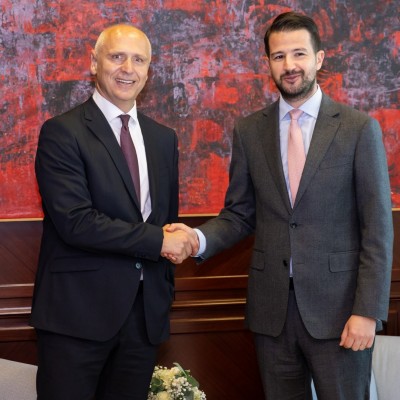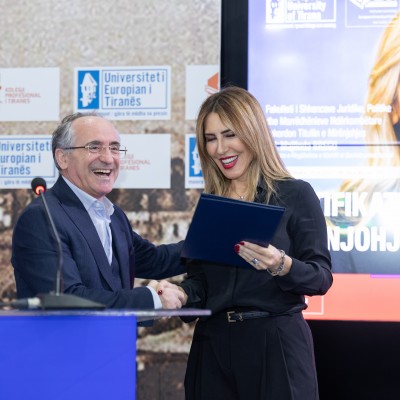European Movements from South East Europe meet for the first time in Sarajevo, under RCC auspices
17 May 2010

RCC Secretary General, Hido Biscevic (left), receives the “European Partnership” plaque from Vice-President of the European Movement in Bosnia and Herzegovina, Dino Colic, at an RCC-hosted meeting of European Movements from South East Europe, Sarajevo, BiH, 17 May 2010. (Photo RCC/ Selma Ahatovic-Lihic)
SARAJEVO, 17 May 2010 – National European Movement Councils from eight South East European countries met in Sarajevo today for the first time to discuss greater civil society involvement in regional cooperation. The event was hosted by the Regional Cooperation Council (RCC) Secretariat.
The discussions focused on better communicating the EU to the citizens of South East Europe; cooperation with national, regional and local authorities in promoting European values and standards; developing cooperation with European and international partners; and enhancing regional cooperation in South East Europe.
“Wide scope of activities, experience and knowledge of national European Movement councils could be of great importance to the quality and efficiency of regional cooperation and European integration, in particular in bringing the EU and its institutions closer to the citizens”, said RCC Secretary General, Hido Biscevic, while opening the event.
“In addition to supporting the EU accession efforts and aspirations of our countries, we also want to foster an open, transparent and regular dialogue with civil society, thus promoting citizens’ participation in public life and in decision-making, while emphasizing the essential values that are shared by the citizens of Europe.“
The participants underlined the indispensable role the civil society organizations play in sustaining democratic development, good governance and necessary societal reforms in South East Europe, in particular against the background of historical complexities and challenges of transition.
The Secretary General of the European Movement, Diogo Pinto, underlined that while learning from the past, it is important to look to the future.
“EU integration is not only about respecting acqui communautaire, but it is also about proving we can work together. The RCC has given us such an opportunity, and I urge you not to miss it, as the dream of Europe united can be fulfilled only by having the entire South East European region in the EU. The European Movement will do its utmost to lend support to this process.”
The conference participants agreed that the RCC would prepare an outline programme of joint future activities with the National European Movement Councils, with the aim of adding regional dimension to their work.
The meeting, organized on the occasion of the Europe Day, was attended by representatives of European Movement’s National Councils from Albania, Bosnia and Herzegovina, Bulgaria, Croatia, Republic of Moldova, Montenegro, Serbia and Turkey.



